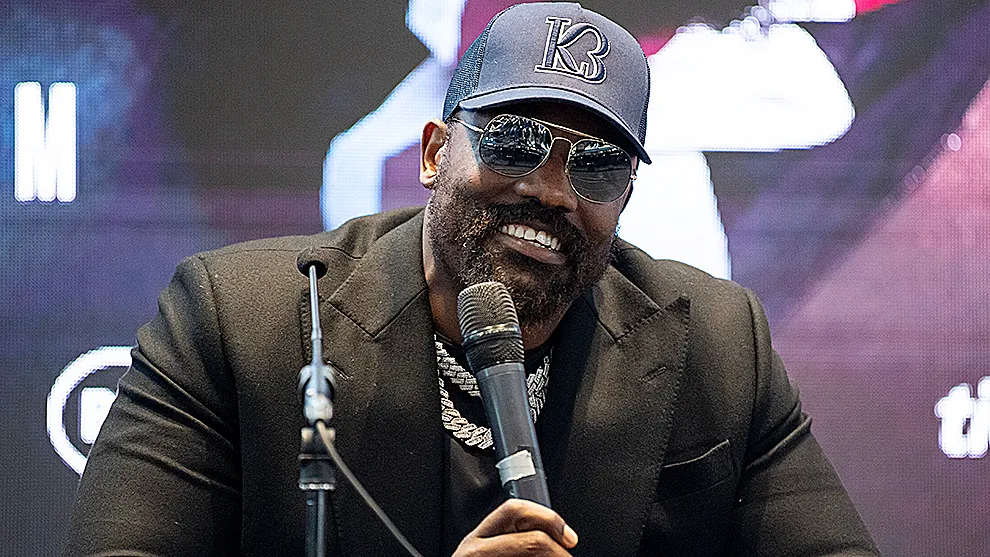THOUGH he maintained a straight face throughout, there must have been a small part of Eddie Hearn, as he listened to Derek Chisora speak, who thought to himself, Yes, this is all well and good, Derek, but if I happen to agree with what you say, where does that leave Conor Benn and our plans for him going forward?
Well, about that Derek Chisora couldn’t care less, apparently. As far as he is concerned, if a boxer gets caught with a performance-enhancing drug in their system – or, to soften the blow, posts an “adverse analytical finding” – they should be banned from the sport for a total of 10 years. That means Benn and indeed Dillian Whyte, the latest to test positive and a former Chisora opponent, would, according to Chisora’s Law, both be finished as top-level boxers. It would also mean Hearn, the promoter who has loyally stuck by Benn throughout his recent trials and tribulations, would be one headliner down in 2023 and beyond.
At 39, it should perhaps come as no surprise that Chisora, 33-13 (23), has had enough. Always one to speak his mind, he is at an age now, I’m sure, where it matters not who is fashionable and who isn’t and, moreover, who happens to be sitting alongside him at the top table of a press conference. Furthermore, for a man who has frequently been told he is carrying on too long in the sport, and that he is in grave danger of becoming harmed by it, it must be doubly frustrating to see boxers all around him, all significantly younger and fresher than him, testing positive for various performance-enhancing drugs and as good as getting away with it. No wonder, then, Chisora spoke so passionately about the issue at this afternoon’s undercard press conference. No wonder, too, he felt the need to say what he said in the presence of a promoter whose overall message regarding PEDs in boxing has been mixed, at best, in recent years.
“I think they should put in a new rule now,” said Chisora, two days away from boxing Gerald Washington in a heavyweight fight at the O2 Arena. “If you get caught taking any supplements (banned drugs) in boxing – this is from the British Boxing Board of Control – it’s going to have to be a 10-year ban straight away. Because how about if you hit that kid and he dies? What are you going to do? I have boxed for 20 years now and I have never taken any drugs. Get caught taking drugs and it should be a 10-year ban straight away. No excuses.”
Dillian Whyte (Mark Robinson Matchroom Boxing)
As harsh and as idealistic as that sounds, Chisora has a point, of that there is no doubt. After all, the only way to really deter boxers from taking drugs is to increase the risk factor, which you do of course by removing all leniency and loopholes.
Consider, for instance, how Dillian Whyte would have felt when seeing Conor Benn given so much time to work on his case, having failed a test – two of them, in fact – last year. Consider as well the reality that every failed drug test inevitably comes with a statement declaring innocence or, worse, complete ignorance, and how, following this, it then becomes a legal matter and there is money involved, which means the punishment often becomes a matter of negotiation rather than course.
“It’s a problem in this sport of ours,” Chisora made clear. “It’s not even the fighters I blame. I blame the trainers: your boxing trainer; your S and C (strength and conditioning) coaches. Those are the guys who give you that shot. You don’t see a boxer go, ‘Let me get online and get this to enhance my body.’ No, no, no. I blame the trainers. ‘If I get this for you, you can do this and do this.’ Those are the people I blame for this.
“Boxing is a hard, hard sport already without people taking drugs. I don’t take drugs in boxing, to be honest with you. But I take drugs when I go to Ibiza. That’s okay. That’s fine. That’s allowed. I smoke a bit of reefer once in a while, but that’s cool. But I don’t take it to fight another person’s kid.”
The subject of coaches is another interesting point and another one rarely explored when a failed test ruins a fight. It is the coach, after all, who is behind the wheel, so to speak, and it would be remiss, too, not to point out that there is a direct correlation between the growing prevalence of PEDs in boxing and the emergence of strength and conditioning coaches, as well as the myriad other hired hands we see inflating the entourages of fighters, particularly at the top level.
Chisora, having been around and part of numerous training camps in the past, is someone who will have come into contact with these people and therefore when he speaks he speaks from experience. Not just that, for as much as boxing may have damaged him to an extent, the time Chisora has spent within the sport, and specifically around top fighters, will have no doubt opened his eyes to the truth.
In light of this, the worry for boxing now is that Chisora, fast approaching 40, is getting restless and tired and even less willing to filter his thoughts or play the game than he was in the past. Maybe, in that sense, he is someone worth listening to, however. Maybe, in that sense, he is a voice the sport needs.
